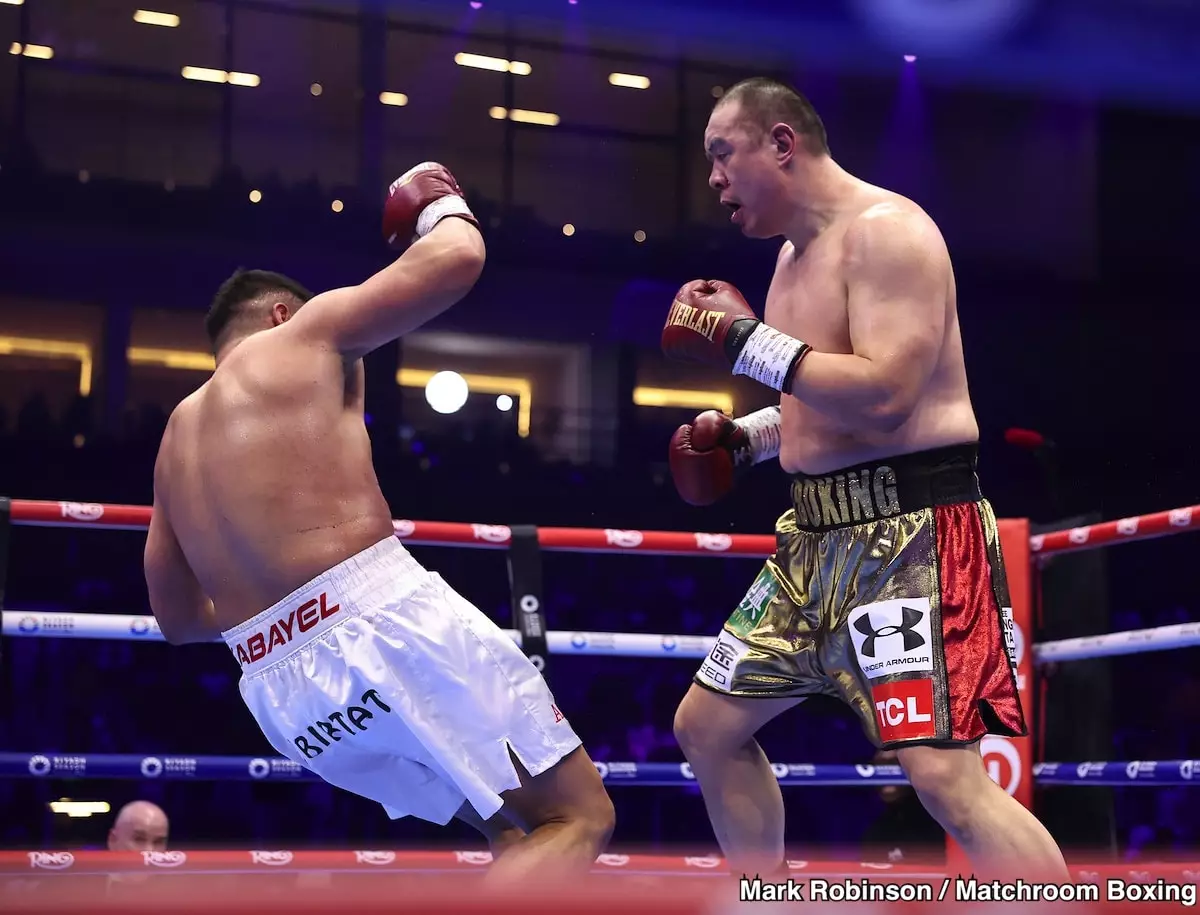The Tenacity of Zhilei Zhang A Heavyweight’s Remarkable Resilience
When you think about boxing, it’s easy to focus on the physicality—the power punches, the swift dodges, and the relentless stamina. But every so often, a story comes along that reminds us that boxing is just as much about mental strength as it is about physical prowess. Zhilei Zhang’s recent experience in the ring is one such tale. Despite the setbacks he faced during his bout with Agit Kabayel, including a punishing body shot that left him breathless, Zhang’s unfaltering determination shines through. At 42, when many athletes consider hanging up their gloves, Zhang decides to forge ahead with a fiery resolve that is truly inspiring.
There’s something undeniably compelling about a fighter who refuses to be defined by age or past defeats. As someone who has been following the sport for years, I find Zhang’s journey particularly fascinating. His statement that “age is just a number” resonates deeply with anyone who believes in the power of perseverance. It’s not just about resisting retirement; it’s about redefining what it means to be an athlete at any stage of life. For Zhang, this moment isn’t an end but rather a launching pad for a new chapter in his career.
This attitude highlights a vital aspect of professional boxing: resilience. When Zhang reflects on the painful conclusion to his fight with Kabayel—an event marked by his fall to the canvas—he embodies both regret and resolve. His candid acknowledgment of feeling “breathless agony” strikes a chord with those who understand the rigors boxers endure. Yet, beneath this admission lies an unyielding spirit where Zhang insists that this setback does not define him; instead, it acts as fuel for his ongoing journey.
Key Takeaways
- Zhilei Zhang showcases remarkable mental strength alongside his physical skills.
- He challenges conventional perceptions of age in professional sports.
- Zhang’s journey emphasizes resilience and adaptability in boxing.
- His story inspires both fighters and fans, highlighting perseverance beyond setbacks.
Rethinking Boxing at an Advanced Age
Zhang’s determination to continue competing in the heavyweight division sparks intriguing discussions about age and athleticism. While some might argue that 42 is too late for a successful comeback, Zhang flips this narrative, proving that he still has what it takes to compete at an elite level. His declaration serves as an inspiration not only to fighters but also to fans who witness his unwavering commitment firsthand. The question remains: can he adjust his fighting style to address vulnerabilities exposed in previous bouts? With losses against top-tier opponents like Filip Hrgovic and Joseph Parker, Zhang’s future battles extend beyond physical fitness into strategic evolution.
In boxing, learning from past fights is crucial. Zhang’s realization that early body shots disrupted his rhythm underscores the tactical nuances necessary for success in the ring. Despite training extensively against such strikes, Kabayel’s high output proved overwhelming—a reality that invites scrutiny over Zhang’s pre-fight strategy and potential limitations due to age. As he faces top contenders at this stage of his career, innovative strategies may be essential either to elevate or hinder his comeback efforts.

The Challenge of Regaining Lost Ground
As Zhang sets sights on future fights, he confronts the daunting challenge of re-establishing his reputation within a highly competitive division. In heavyweight boxing, success hinges not only on raw punching power but also on an ability to learn and evolve continuously. Although Zhang boasts 27 wins against 3 losses, reality bites—the heavyweight division is teeming with talent and rising stars eager for their shot at glory. Opponents will likely target their attacks on the body—a tactic that’s proven effective against him before.
This challenge underscores a critical aspect of Zhang’s resurgence: becoming more than just physically adept; he must evolve into a tactical mastermind inside the ring. Each body shot absorbed serves as a reminder of defensive maneuvers’ importance—transitioning reliance away from sheer physical strength towards strategic excellence could prove pivotal in sustaining his comeback journey. Moreover, carefully selecting well-matched opponents will be key in regaining momentum while showcasing enduring capabilities within competitive settings.
Looking Ahead Potential Matchups and Fan Engagement
Despite evident challenges surrounding his career revival efforts—one cannot overlook potential spectacular bouts involving Zhilei Zhang capturing global attention among boxing enthusiasts worldwide! The anticipation surrounding possible matchups between Zhilei Zhang versus Anthony Joshua holds great promise—not just because both fighters possess unique styles guaranteed excitement & drama regardless outcome—but also because these encounters allow fans deeper engagement while testing where exactly stands amongst heavyweight ranks today!
In sport defined by grit & glory alike—Zhilei Zhang encapsulates narrative determination transcending mere statistics associated aging athletes! Willingness confront both physical limits alongside evolving challenges within boxing illustrates indomitable fighting spirit extending beyond squared circle confines altogether! As seeks claim victories renewed quest heavyweight prominence ahead though stands testament notion perseverance adaptability indeed foster resounding success even later life stages!
Final Thoughts
Zhilei Zhang’s tenacity offers valuable lessons not only for aspiring boxers but anyone facing life’s inevitable challenges head-on! His refusal concede defeat amidst adversity exemplifies triumph human spirit over perceived limitations time itself imposes upon us all! Whether ultimately achieves sought-after comeback remains secondary importance compared broader impact story inspires countless individuals worldwide pursue dreams relentlessly regardless obstacles encountered along way! Herein lies true essence greatness—persistently striving better oneself despite odds stacked against you!
Zhilei Zhang
Boxing Resilience
Heavyweight Boxing
Age in Sports


Leave a Reply